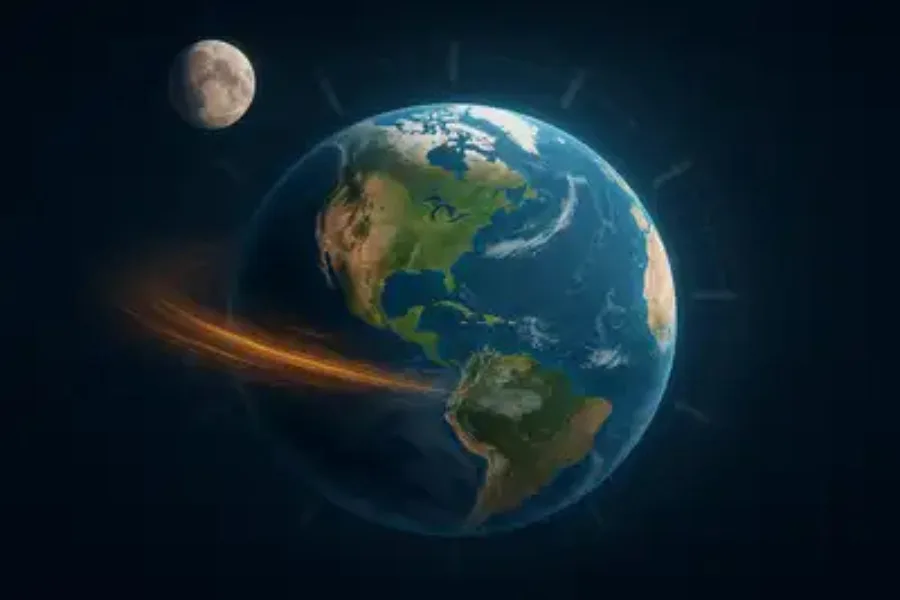
Earth Spinning Faster 2025: In an unprecedented twist pertaining to time measurement, Earth is turning a bit faster this summer. This means that our days are a fraction of a second shorter than usual. This is prompting scientists to consider an extreme change in how we measure time. On July 10, 2025, the was the shortest day of the year at the time. It was about 1.36 milliseconds shorter than the normal 24 hours. And that’s just for starters.
As we focus on our progress monitored by international timekeeping bodies, time measurement is fast becoming one of the most talked about trending news today — and for good reason.
What’s Making Earth Spin Faster?
A day is the time it takes for Earth to make one full rotation on its axis. It is about 86,400 seconds. But forces such as the gravitational pull of the moon, atmospheric processes taking place, and centrifugal forces related to Earth’s liquid core can cause fluctuations in rotational speed leading to slight changes in the length of time within each daily rotation.
We are not seeing these fluctuations for the first time, we are just noticing them more. “We have been observing an increase in the speed of days since 1972”. Says a geophysicist at the University of California, San Diego, Duncan Agnew. A few days are expected to have been shorter this summer: July 22, July 5 and August 5. Those days are expected to be 1.34 milliseconds and 1.25 milliseconds shorter, respectively.
Atomic Clocks and the Battle for Precision
Atomic clocks, in 1955, established the basis of Coordinated Universal Time (UTC) standardizing time worldwide. These clocks are able to measure the vibrations of atoms with extreme precision. However, UTC can fall out-of-sync with the Earth’s natural rotation. It can be forced to leap forward through one single, one second adjustment we call a “leap second.”
Thus far, since 1972, there have been 27 leap seconds. With a speedup in the Earth’s rotational velocity, we are now at a critical juncture in history; as of yet, we may be encumbered to execute our first, negative leap second.
“We didn’t think when we developed the system that we could remove one second,” said Judah Levine, a physicist with the National Institute of Standards and Technology. “But now, we are looking at a 40 percent chance we will have to add one by 2035.”
Significance: Technology, Satellites, and Temporal Disruption
Seemingly marginal milliseconds have the power to wreak havoc today. Today’s telecommunication, satellite, GPS, financial system, and power grids all rely on ample timekeeping measures — small differences can cause malfunctions, data-loss, and system errors!
Adding a negative leap second has some inherent dangers. While the positive leap second is well established, this hasn’t been resolved – and causing chief experts to worry about a “Y2K-like” disruption, if not implemented appropriately.
Could Climate Change Be Standing in the Way?
Interestingly, climate change may be stopping this negative leap second – at least for the time being.
In a study published in Nature by Duncan Agnew demonstrates that melting ice in Greenland and Antarctica has slowed down some areas of Earth’s rotational speed. As the ice turns to ocean, it causes a redistribution of mass across Earth’s surface, thereby slowing down its spin – akin to a figure skater slowing down when opening their arms.
Agnew says, “Without this redistribution of melt water, we would already be observing a negative leap second.”
The Future of Leap Seconds
The General Conference on Weights and Measures plan in 2022 was to abolish the leap second by 2035. But if the Earth continues to speed up, that plan may need to be reconsidered. If the Earth indeed requires a negative leap second, it will certainly be a first in the history of timekeeping.
Another layer of complexity arises from uncertainty in forecasting. While short-term forecasts can be quite accurate, long forecasts that span months or years can become less reliable. As Levine notes, “The Earth is uncertain over longer timescales.”
What Comes Next?
The fast-rotation trend, could turn in the other direction — or get faster. Some scientists, including Benedikt Soja of the Swiss Federal Institute of Technology, warn that climate change may ultimately dominate these effects — possibly to the extent that it will be larger than the moon’s gravity. They are particular monitoring the data, as they are going to have contingency plans ready for any outcome — including the depressingly unprecedented outcome of eliminating second from global timekeeping.
While we wait for concrete action, this fascinating story is still trending today, suggesting that even time is now being affected by the forces shaping our world.







İstanbul da su kaçak tespiti Esenler’de su kaçağı tespiti yaptırdım, başarılı bir sonuç aldım. Kesinlikle tavsiye ediyorum. https://neorural.es/read-blog/3680
427vmf
onpsge
Embark into the massive realm of EVE Online. Become a legend today. Build alongside hundreds of thousands of explorers worldwide. Join now
Your point of view caught my eye and was very interesting. Thanks. I have a question for you. https://accounts.binance.info/register-person?ref=IXBIAFVY
Your article helped me a lot, is there any more related content? Thanks! https://accounts.binance.com/zh-TC/register?ref=DCKLL1YD